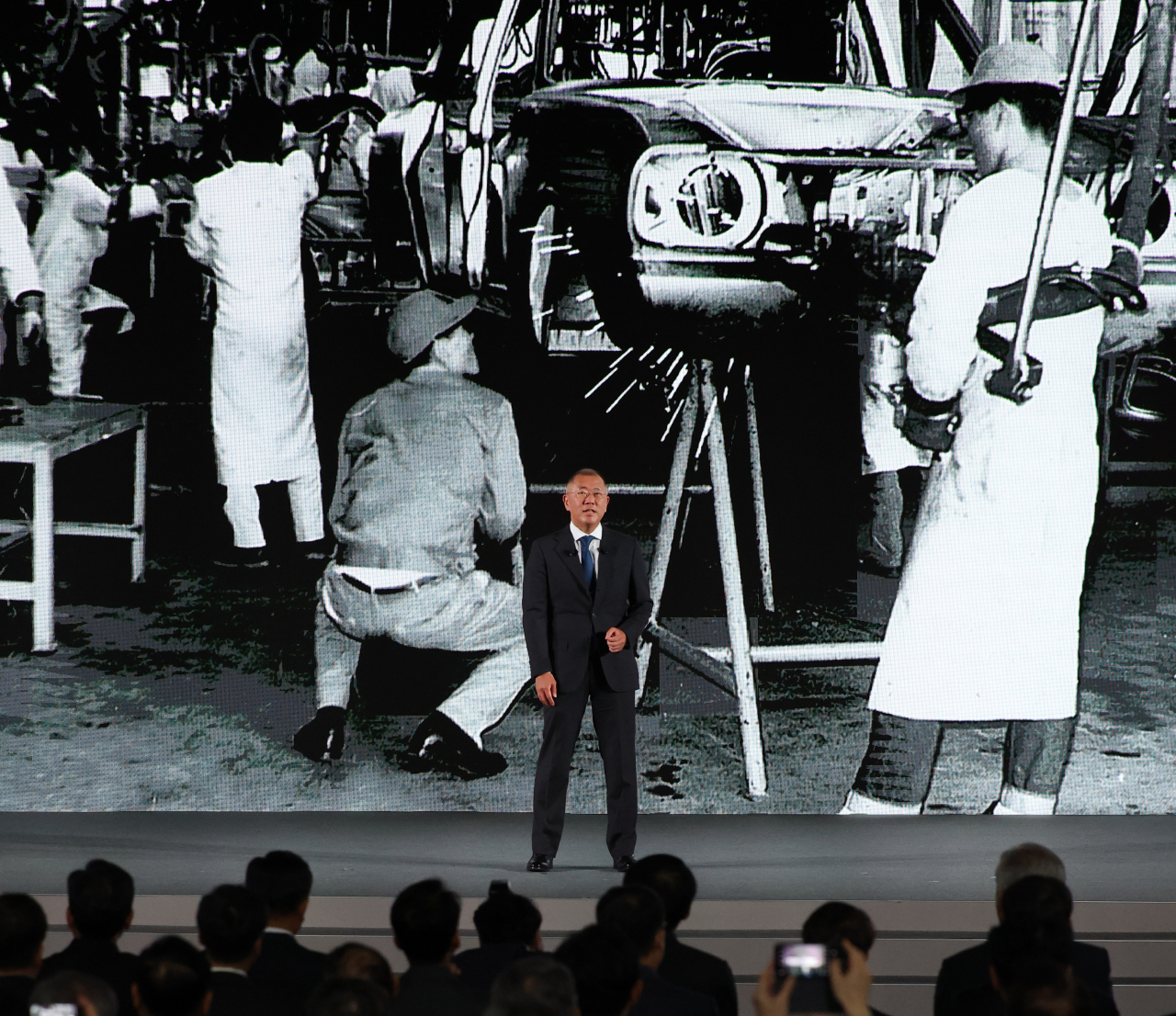[From the Scene] Building 100-year heritage: Hyundai starts work on Ulsan EV plant
Carmaker’s first plant at home in 29 years to become operational in 2026
By Byun Hye-jinPublished : Nov. 13, 2023 - 15:29

ULSAN – Hyundai Motor Group on Monday broke ground for a new plant at home – the first in 29 years – solely dedicated to producing electric vehicles.
Earlier in the day, the world’s third-largest carmaker held a groundbreaking ceremony for the new plant in Ulsan, South Gyeongsang Province, one of its key production and export sites, with its top executives, including Executive Chair Chung Euisun, in attendance.
The EV plant will be built on a 548,000-square-meter site, next to the fourth plant within the Ulsan complex. The area used to be a test-driving site for new cars before their market debuts in the 1980s. Hyundai’s steady sellers like the Sonata, Accent and Avante all underwent rigorous performance and quality tests there.
Under a 2 trillion won ($1.5 billion) investment plan, the plant is scheduled to become operational by the first quarter of 2026 with an annual production capacity of 200,000 units. The first model to be produced is an electric version of Genesis’ new large-sized sport utility vehicle, the first Genesis car to adopt the company’s own EV platform, E-GMP.
The upcoming plant, the sixth of its kind within the Ulsan complex, will become Hyundai’s first plant to be built in Korea following the previous one set up in Asan, South Chungcheong Province, back in 1996.
Hyundai said it is meaningful to build a cutting-edge production facility on the site.
“The Ulsan EV manufacturing plant is another stepping stone for Hyundai toward electrification for the next 50 years. I’m honored to share the company’s dream of building 100 years of heritage,” said Chung in his celebratory remarks.
Half a century ago, it was hard to think that Korea might become a powerhouse in car manufacturing, however, automotive technologies developed in the Ulsan plant laid the foundation for setting up the Asan and Jeonju plants, followed by rapid global expansion to countries such as India and the US, Chung noted.
Hyundai also unveiled a special video featuring the voice of late Hyundai founder Chung Ju-yung, the chairman’s grandfather, making a speech -- all generated by artificial intelligence. In the video, the late Chung said, “Our greatest weapon is the world’s best craftsmanship. I believe our cars -- cars made in Korea -- will soon make a name for themselves worldwide.”
Under the charismatic Hyundai founder’s watch, the company completed its first plant in 1968 and launched the first Korea-made car, called the Pony, in 1975. After that, Korea started producing its own car parts and equipment.
Highlighting worker safety and work efficiency, the brand-new plant looks to become a futuristic production site based on an innovative manufacturing platform developed by the Hyundai Motor Group Innovation Center in Singapore.
Using smart logistics automation technologies and the digitalization of product data for quality control -- powered by robotics and AI -- the Ulsan base will continue to play a key role as a “mother plant,” according to Lee Dong-seock, vice president of the company’s domestic production department.
Lee added the plant will be a human-first workplace and have an eco-friendly environment. Workers will be able to enjoy natural light and engage in casual communication in open lounges. It plans to design a central park filled with plants that connects every building within the site. Solar power generation and upcycling in manufacturing processes will minimize carbon emissions for sustainable growth.
The Ulsan complex is one of the key export bases for Hyundai globally. Last year, the complex exported a total of 935,590 vehicles -- including electric models such as the Ioniq 5 -- about 66 percent of its total production.



















![[Today’s K-pop] Treasure to publish magazine for debut anniversary](http://res.heraldm.com/phpwas/restmb_idxmake.php?idx=642&simg=/content/image/2024/07/26/20240726050551_0.jpg&u=)